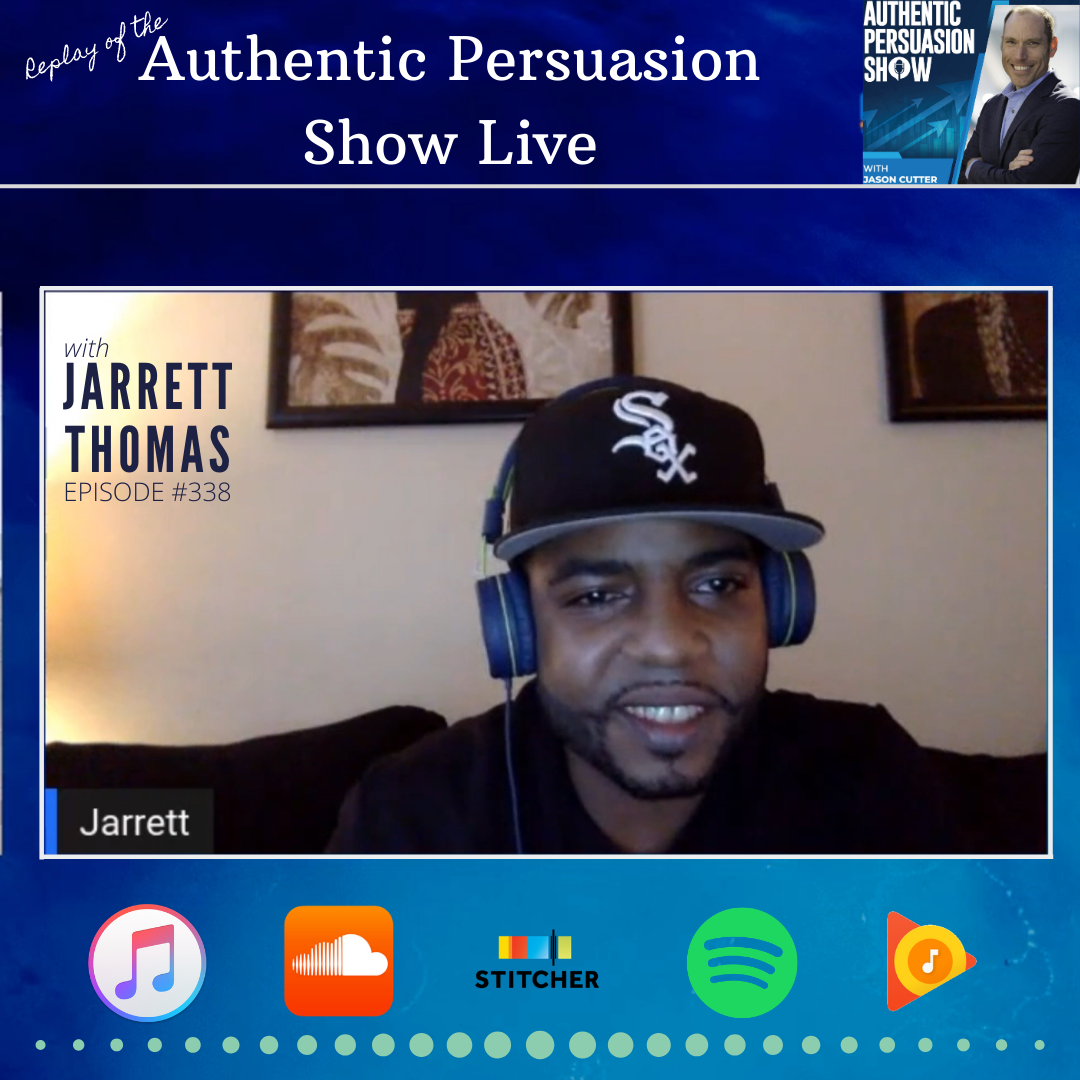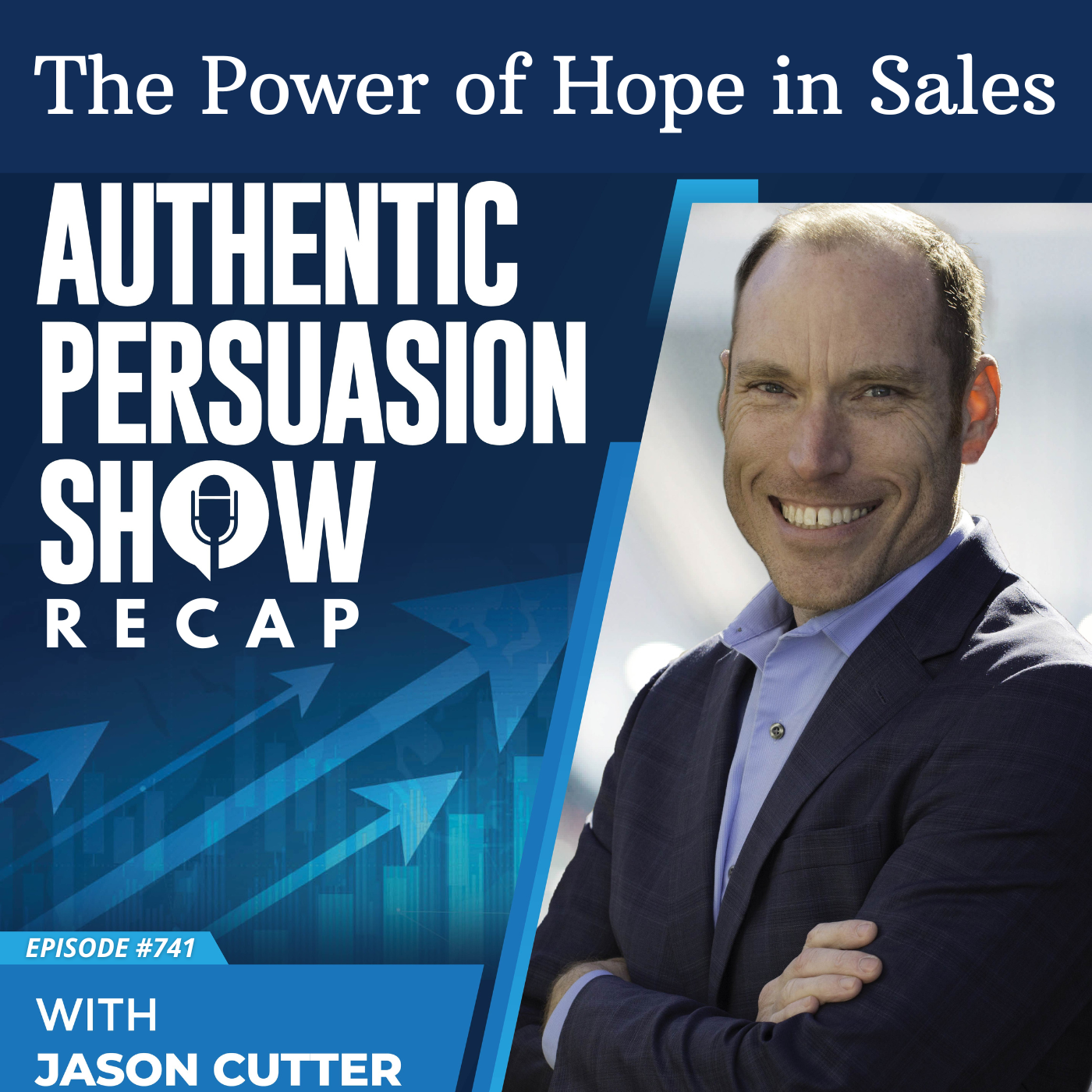Show Notes
Are you responsible for setting up your team with the best prospect data possible?
Eric Kider, from Credit.net/Infogroup joins me for a 4-part series where we talk about business prospecting data, accurate sources of data, and the sales closing effectiveness metrics.
In Part 1, Eric and I talk about:
- Who owns the best data
- Compilers vs. Aggregators
- Data verification methods
Download The Power of Authentic Persuasion ebook
Enroll in the Authentic Persuasion Online Course
Connect with Jason on LinkedIn
Connect with Eric on LinkedIn
Eric’s Bio:
Eric is the Senior Vice President & General Manager for Credit Solutions at Infogroup. Credit.net provides in-depth information on businesses of all sizes, including small businesses:
•To empower people with the ability to make smarter business credit decisions.
•Identify opportunities in the industry, unmet customer needs, core competencies of Infogroup
•Cross-selling to existing customers, and partnership possibilities
•Create detailed roadmap including resources and investments needed
•Product Improvements envisioned, partnerships channels, go to market and sales changes, etc.
•Refine product offerings and develop new solutions based on market feedback
•Collaborate across Infogroup to drive cross-selling and leverage the broader platform of services.
•Work with the executive leadership team and present to Board growth strategies, investment requirements, and acquisitions.
Eric holds a bachelor’s of arts degree in economics and government from Skidmore College in New York. His post-graduate studies were in business administration, management, and operations from Sheffield Hallam University in the United Kingdom.
Eric’s Links:
LinkedIn: https://www.linkedin.com/in/erickider/
Infogroup: https://www.linkedin.com/company/infogroup/
Credit.net: https://www.linkedin.com/company/credit-net/about/
Facebook: https://www.facebook.com/Infogroup/
Twitter: https://twitter.com/Infogroup
E176 – Transcript
Jason: Welcome to the sales experience podcast. My name again is Jason cutter. On today’s episode, I have Eric Kider, he is the senior vice president and general manager of credit solutions at Infogroup and he is driving his division to satisfy the business needs within small and medium business credit markets. Eric, welcome to the sales experience podcast.
Eric: Thank you so much, Jason.
Jason: So I’m really excited to have you on the show and I know I say that for every single guest I talked to, but everybody comes from so many different backgrounds and have many different focus. And for you with that intro that I was covering, I mean what you do now and what you focused on for a while is helping businesses with either their own credit information or helping them with getting the data for their prospecting side. And obviously I have a wide range of listeners, anything from sales reps to managers to owners. And I thought this would be a fun topic for us to cover and you know, talk about prospecting and data and credit and wherever this might go.
Eric: No, that’s great Jason. Well, thank you again for the invitation. I’m excited to be here.
Jason: One of the things that I know that we’ve talked about in the past, and we’ve done some work together with clients on the, you know, on the data side and prospecting is this concept which a lot of companies don’t understand. When I’m dealing with them on the consulting side and we’re talking about sales, we’re talking about marketing. Everybody wants to get the good leads or they want to buy data and they don’t understand the difference between, you know, someone who’s aggregating data or someone who has the actual source of data or verified data. So I thought that’d be a fun place to start to kind of help clarify that for people who are listening.
Eric: Yeah, I know, that’s a great point. Well, you know what’s interesting about data, especially more so today than you know, 2030 even 50 years ago, data is available almost everywhere and through multiple sources. You know, people today leverage Google or Bing or any of the search engines. And a lot of times people who, you know, think that those search engines are the originators of that data. In other words, people think Google is everything, right? It’s the Uber of the world of information. But what people don’t realize is that actually Google, just like being in other search engines actually source their data to power that search through other companies through providing that information as part of being the data compilers. And there are only maybe two or three major data compilers in the US market. Infogroup is one of those data compilers. And what that is in reality for people to understand is that the compiler is the originator of the data they use and leverage inclusive of us with Infogroup leverage is thousands of sources in order to build our business and consumer databases.
Eric: And then there are second data providers out there that are more resellers. And so what they’ll do is they’ll typically work with one of the data originators or compilers and then they’ll take that data and they’ll either do some manipulation or some additional what they consider to be value add to that core. But in some cases, most people don’t realize who they’re buying from, whether it be a compiler or a reseller. And that does matter because the aging factor and the data latency factor comes into play because the compilers in the market have that information in the most recent and UpToDate and current fashion versus a reseller, which data could be, although it’s presented as current, it could be anywhere between a week to two weeks to up to even months old in that of latency in aging. So it does matter to understand the difference between that compiler and a reseller. And that’s kind of an important element when you are thinking about going after and looking for acquiring new customers or even looking to perform either credit or some type of risk management for your company.
Jason: And so for compilers, how like let’s say Infogroup or others in the market, like how often is that data being refreshed, updated? You’d said the other ones are, you know, could be weeks old. But what’s a compiler at?
Eric: Well, the compiler, so for info group, we have updates made to our database every day. In fact, every minute, every hour of the day gets updated based on the process that we have within our data operations team. So that could be made through a series of automation technologies that we leverage, whether it be web crawling or others, including that of we still are leveraging outbound phone calls in our tele research team who actually call and make outbound phone calls, approximately 25 million per year to businesses across the US and Canada to verify and confirm some of their basic demographic and firmographic information. And when I tell that to clients, you know, they kind of say, well that sounds pretty old school. And in our case, we believe that as a compiler of data that’s critical, especially if you’re trying to make sure that when you’re making an outbound phone call or mailing a direct mail to a given client at a location to promote your goods and services, we still think that that’s the best way to confirm that that business is still operating as though it is and should be to make your campaigns that much more effective. Whereas on other companies that are resellers, you know, like I said, they’ll take our data and that data could be anywhere between five days up to a month if not longer old. And although it’s still good and it’s still accurate, there is a difference of dimensionality as to what you’re trying to do when you’re thinking about going to market and doing your various campaigns for driving that growth in that given discipline would be sales, marketing or even doing some type of credit or risk management for your company.
Jason: Well, and I think that’s interesting because a lot of people, I’ll say for myself as well, not understanding all of the data back end as well as you do, is that there’s a misunderstanding that if it’s on the internet, A. it’s accurate and B. it’s updated constantly and it’s instant, right? So if I look up a company, whatever’s on there should be accurate. And it’s interesting because sometimes I’ll look up, you know, even let’s say it’s a restaurant or a business, a local business, and at times it says people are reporting that this business is closed and you know, it’s, it’s still online, right? The business has actually gone out of business or shut down and you know, only through let’s say a Yelp comment. Do you have any indication that it may or may not exist anymore?
Eric: Oh that’s absolutely right. And, and you know, it’s interesting, you know, cause that’s a great example where, you know, even crowdsourcing or that of the, the way in which people today you leverage those sites like Yelp or, or even for example even TripAdvisor, right? You have people now adding content and feedback to that of you know, companies, businesses that they are engaging with. That actually provides another source of information for companies to leverage. And that’s by the way, some of that information we do leverage. We leverage a lot of social sites in order to populate and provide a richer and broader depth to our business record as well as our consumer record. But in our case, you know, there are also different gradients of data quality that we also share with our clients so that for example, you know companies will put out the size of their database, right?
Eric: They’ll tell you they have 30 million, 50 million records or businesses in the US or Canadian market or whatever market they’re operating in. Well, they don’t tell you whether or not they have the depth of verifying that company record. Going back to what you said about whether it’s still in business or what type of you know status are they and an info group. We do have four different categories of data, so we have a verified record, which means that that company we have physically spoken to, confirmed and accurately portrayed that of the information that that is a real business operating at the location with the details that allow you to know that we’ve physically spoken to that person or that company. We have a pre-verified record, which means that we believe that the company is operating as a business, but we’ve not been able to connect with anybody at that firm in order to confirm that of what we’re doing or what they’re doing with that of what their business.
Eric: We then also have a suspect record where we actually have a belief that that company could be operating but their operation may be out of business at that location. They’re not returning our phone calls so we can’t call it even pre-verified cause we’re just not certain as to what is the current delineation or status. And so we call it a suspect record. And then yes, we also have out of business records and in that case, Jason, we only put an out of business record when we’ve confirmed it with the secretary of state in which that business was operating that they too filed as an out of business. In other words, they closed that entity or that location. So we had that gradient of different quality because we want businesses to understand when they’re engaging with their different campaigns or different sales and marketing activities, we want them to know that ultimately they’re working with a business that either is verified or in some cases not. It doesn’t mean you shouldn’t do business with them, but it means that you should definitely proceed with caution because we’ve not been able to confirm that that is a legitimate or valid location or the correct data for that company.
Jason: So as I’m listening to you talk, I’m thinking about all of this data, the verifying and everything that’s going into this or talking about aggregator, you know, kind of compilers versus resellers and people who are, you know, kind of lagging or, or adding things to it. But it’s not from the source itself. And you know, I’m thinking about the fact that anybody who’s listening to this who has experience getting data or doing any marketing knows that the cost is just going to go up and up. Obviously the more accurate, more detailed, more information that you have and the more current, right. So the older it gets, the more times it’s been resold or the less accurate that it may be. Obviously the cheaper it’s going to get. So you know when we’re talking about that, which again it’s all about what you get for your money, right? It’s not that spending more is bad. It’s all about at the end of the day is the data you’re buying, the marketing you’re doing effective to get the right leads in front of your sales reps, and then is it profitable, right? Like the end of the day, are you producing something that meets your cost per acquisition? Are you making profitable sales and you know, have a lifetime value that well exceeds you know, what you’re spending in marketing and sales.
Eric: Absolutely. Absolutely. And you know, it’s interesting Jason, cause you know I’ve had a couple of recent conversations with clients as they kind of crossed over into 2020 and you know, some of them have asked me because of my background, which data provider you know are better than one versus the other? Or which one should we be leveraging? Or in some cases, they even ask, you know, how is Infogroup better than X or Y as a comparative? And you know, I’ll tell you Jason, what’s interesting about what you said is, I wish I could say that there is one perfect data provider, but there aren’t, because everybody’s business and use cases are very unique. Now, I always say is a best practice, leveraging that of our data alongside a secondary data provider, whether it be a compiler or a reseller is a best practice because you have the best of both worlds.
Eric: And when I say that to certain clients, they say, Oh God, but that really adds, you know, cost almost double the cost to my data and overall marketing efforts. And actually it’s not the case because when you do the real ROI in the development of looking at what the cost is to do your marketing campaign, by looking in, leveraging the best data upfront and doing that kind of analysis, you’re actually saving money by not having campaigns sent out to information or customers that are actually not accurate or that’s not the right data or worse, it’s the wrong audience and therefore where you think you’re spending too much money on the front end of getting the right data at the right analytics put in to get the right prospect universe put together. In fact, if you do really the comparison downstream, you realize that you’re actually spending a lot more money by not doing that first step of.
Jason: Alright, everybody, that’s it for part one of my conversation with Eric Kider from Infogroup. Please make sure to check out the show notes, the transcription, Eric’s links in the information on the podcast. You can go to cutterconsultinggroup.com where you can find the episode and all the episodes on there. Also make sure to subscribe, share the podcast every time you do it helps spread more information and positive outlook and focus on how sales could and should be done out there in the world. So I appreciate it and any little bit helps. Everything makes a difference. So thanks again. And as always, keep in mind that everything in life is sales and people remember the experience you gave them.
![[E176] Leveraging Prospect Data with Eric Kider – Part 1 of 4](https://episodes.castos.com/salesexperiencepodcast/images/Eric-Kider-Profile-Pic.png)


